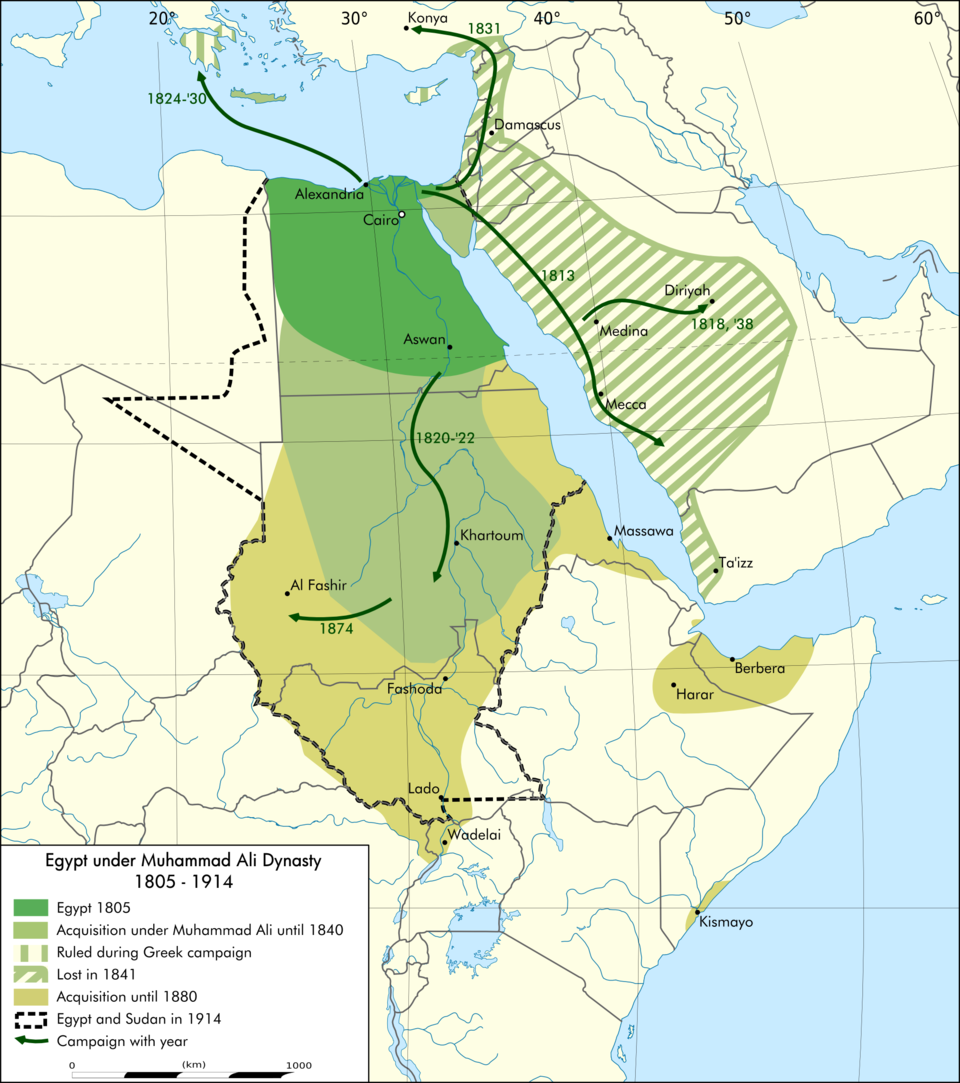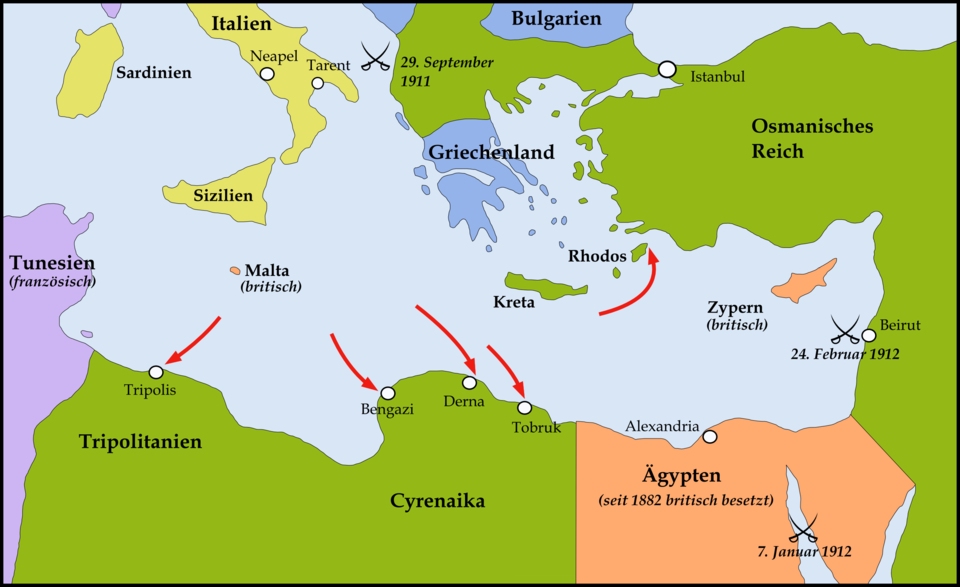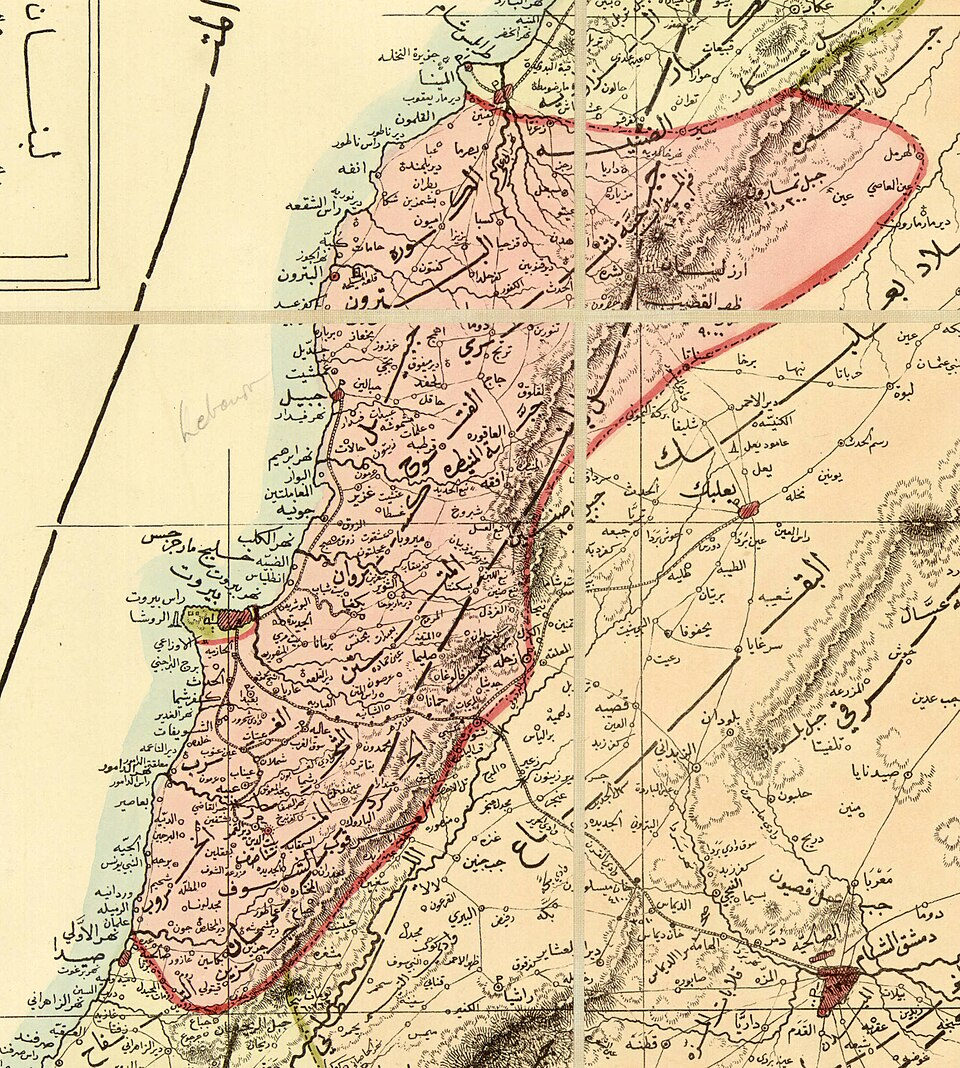IB Syllabus focus:
'Study the decline of Ottoman power in regions such as Egypt, Libya, Algeria, and Lebanon during the 19th century.'
The 19th century was a period of significant retreat for the Ottoman Empire across the Middle East and North Africa, marked by local uprisings, European encroachment, and the empire's own faltering grip on its territories.
Egypt: The Rise of Muhammad Ali Pasha and His Dynasty
Muhammad Ali's Ascent to Power: Initially dispatched to evict the French and restore Ottoman rule, Muhammad Ali Pasha seized control as the governor of Egypt.
Military Reorganisation: Ali Pasha established a strong military force utilising European training and techniques.
Agricultural Overhaul: Introduced cash crops, particularly cotton, transforming Egypt's agricultural output and economic landscape.
Education and Industry: Western-style educational institutions were created, and local industries were encouraged, further distancing Egypt from Ottoman influence.
The Question of Succession: Ali Pasha’s ambitions extended to establishing his own dynasty, challenging the Ottoman Sultan's authority, leading to a hereditary rule recognised by the Sultan in a bid to prevent a complete secession.

This map depicts the territorial expansion of Muhammad Ali’s Egypt in the first half of the nineteenth century, including campaigns into Sudan, the Levant, and Arabia. It illustrates how Egypt’s growth under Muhammad Ali intensified its de facto autonomy from the Ottoman center. The legend distinguishes phases of expansion and areas of influence. Source
Libya and the Struggle Against European Dominance
Diminishing Ottoman Influence: The Ottoman hold on Libya was nominal at best, with the Karamanli Dynasty acting as semi-autonomous rulers under the empire's umbrella.
Italian Invasion and Occupation: Italy's invasion and subsequent occupation in 1911 (Italo-Turkish War) highlighted the inability of the Ottomans to protect their territories, signalling a stark retreat of power in North Africa.

This overview map shows the main fronts and outcomes of the Italo–Turkish War (1911–1912), in which Italy seized Tripolitania and Cyrenaica from the Ottoman Empire. It locates key coastal zones and islands implicated in the conflict. Labels are simplified to support rapid spatial orientation for the campaign. Source
Algeria: French Colonial Ambitions and Ottoman Loss
French Colonisation: The invasion by France served a dual purpose: curbing piracy and expanding their colonial empire, leading to a protracted military campaign against local resistance.
The Resistance of Abd al-Qadir: A local leader, Abd al-Qadir, mounted a robust resistance against the French but was ultimately defeated, signifying the impotence of Ottoman support and the rise of European colonialism in the region.
The Aftermath: The conquest of Algeria represented a loss of a significant revenue source for the empire and a blow to Ottoman prestige.
Lebanon: Sectarianism and the Fracturing of Empire's Grasp
Maronite-Druze Conflict: The sectarian conflict between the Maronite Christians and Druze, inflamed by European interventions, escalated into a civil war in 1860.
Ottoman Reorganisation of Lebanon: In the aftermath, the Ottoman Empire implemented the "Mutasarrifate of Mount Lebanon" - a special administrative status intended to quell tensions and placate European interests.

This late-nineteenth-century map shows Mount Lebanon and adjacent Ottoman Syrian districts during the Mutasarrifate era. It helps visualize the autonomous administrative unit created after the 1860 violence. Note that the surrounding labels extend beyond Mount Lebanon to regional localities for context. Source
Internal and External Challenges
Waning Territorial Authority
Governors and Local Authorities: Governors with personal power bases frequently defied the central government, operating with autonomy.
European Diplomacy and Military Pressure: Europeans used diplomacy and military might to force the empire to capitulate to their demands.
Economic Troubles
Capitulations to Europe: Trade agreements gave European powers economic advantages, undercutting Ottoman merchants and craftsmen.
Financial Dependence: To finance modernisation efforts and maintain its bureaucracy, the empire took on heavy foreign debt, particularly from British and French banks.
Inefficient Governance
Pervasive Corruption: Ottoman administrative practices were often characterised by nepotism and bribery, leading to widespread disenchantment.
Challenges in Communication and Control: The geographical extent of the empire made centralised control difficult, exacerbated by rudimentary communication systems.
Ottoman Responses to Decline
Military and Administrative Attempts
Occasional Military Campaigns: The empire launched military campaigns to reassert control but with mixed results, often hampered by inadequate resources and European interference.
Administrative Reforms: Attempts at centralisation and modernisation of the state apparatus took place, though they were hampered by internal resistance and lack of sustained effort.
European Relations and Concessions
Diplomatic Engagements: The Sublime Porte engaged in continuous diplomatic efforts to manage relations with the increasingly powerful European states.
Territorial Concessions: To prevent direct conflict and to appease European powers, the empire made concessions, ceding control over various regions, such as Egypt and Tunisia.
The Consequences of Empire's Decline
Social and Political Impacts
Emergence of Nationalist Movements: The loss of central control provided a fertile ground for the rise of nationalist movements within the Ottoman territories.
Sectarian Strife: Weakened imperial oversight led to an increase in localised sectarian strife, as seen in the case of Lebanon.
The Geopolitical Aftermath
European Colonisation: The decline of Ottoman influence directly led to the colonisation of North Africa by European powers.
Power Vacuum: The retreat of the Ottoman Empire from regions like the Balkans and the Middle East created a power vacuum that would contribute to regional instability.
In conclusion, the 19th century witnessed a significant contraction of Ottoman control across the Middle East and North Africa. The actions of Muhammad Ali Pasha in Egypt set a precedent for semi-autonomy within the empire. The loss of Algeria to France was a substantial blow both economically and in terms of prestige. Italian colonialism in Libya and the reorganisation of Lebanon following sectarian conflict demonstrated the external and internal pressures that contributed to the empire's decline. This decline was not just territorial but also a symptom of the changing global order, with European powers asserting their dominance and the Ottoman Empire unable to adapt swiftly enough to preserve its integrity. The legacies of this period are complex and long-lasting, with the shadows of these events extending well into the 20th century and beyond.
FAQ
The opening of the Suez Canal in 1869 had a profound impact on the Ottoman Empire’s control in the region. While the canal itself lay within the Ottoman vassal state of Egypt, its management quickly fell under European control, particularly that of the French and later the British. The strategic importance of the canal as a route to India heightened British and French interest in the surrounding areas, leading to increased intervention in Egypt and the eventual British occupation in 1882. This undermined Ottoman sovereignty and highlighted the empire's inability to control vital trade routes and strategic assets within its own territories, further signalling its decline as a great power.
Foreign debt played a crucial role in the Ottoman Empire’s loss of control over its North African territories. To modernise its army and infrastructure, the Ottoman state borrowed heavily from European countries, particularly Britain and France. This indebtedness led to significant European financial control over the Ottoman economy, culminating in the establishment of the Ottoman Public Debt Administration in 1881. European powers exploited this indebtedness to exert political and economic influence within the empire, often at the expense of Ottoman sovereignty. In North Africa, the empire’s financial struggles meant that it could not afford to suppress local rebellions or counter European aggression effectively, leading to the gradual relinquishment of territories like Egypt and Libya to stronger European control.
The Urabi Revolt, which took place from 1879 to 1882, was significant as it represented both a nationalist uprising against the Ottoman-appointed Khedive and the increasing European influence in Egypt. The revolt was led by Colonel Ahmed Urabi and was rooted in the discontent among Egyptian military officers and the wider population against foreign interference and corruption. While it was directed against the Khedive, it also implicitly challenged the waning authority of the Ottoman Empire over Egypt. The rebellion ultimately prompted the British to intervene and occupy Egypt to protect their interests, including the Suez Canal. The Ottoman Empire, heavily indebted and militarily inferior, could not support the Khedive against the rebels or prevent the British intervention, thus the revolt marked a pivotal moment in the disintegration of Ottoman influence in Egypt.
Nationalism began to take root in North African Ottoman territories as local leaders and the populace increasingly identified with their own ethnic, cultural, or religious communities rather than the distant Ottoman caliphate. In regions like Egypt, the rise of Muhammad Ali Pasha fostered a sense of Egyptian nationalism that differentiated Egypt from the rest of the empire. This was furthered by his military and economic reforms which cultivated a separate Egyptian identity. In Algeria, the French conquest and the resistance led by Abd al-Qadir galvanised a sense of Algerian nationalism against both the French and the nominal Ottoman rule. Nationalism thus contributed to the fragmentation and erosion of Ottoman authority as loyalties shifted away from the Sultan and towards local or national leaders and identities.
The Tanzimat Reforms, initiated in 1839, were a series of governmental reforms aimed at modernising the Ottoman Empire and curbing its decline. They played a significant role in attempting to address the administrative inefficiencies and to centralise power, which had become diffused throughout the provinces, including in the Middle East and North Africa. The reforms included updating the tax system, overhauling the legal system with the introduction of new commercial and penal codes, and instituting changes in land laws. However, the effectiveness of these reforms was often limited by entrenched local interests, resistance from conservative factions within the empire, and the empire's deteriorating financial situation. In regions like Egypt and Lebanon, where local rulers or sectarian divides existed, the Tanzimat Reforms either came too late or were implemented only superficially, doing little to reverse the trend of Ottoman decline.
Practice Questions
Muhammad Ali Pasha's policies in Egypt exemplify the Ottoman decline through his semi-autonomous rule and modernisation efforts that eclipsed the Sultan's influence. He reformed the military and agriculture, which fortified Egypt's self-sufficiency and undermined Ottoman control. His actions not only demonstrated the weakening central authority of the Ottomans but also foreshadowed the empire's diminishing role as European powers' influence grew. The Pasha’s initiatives marked a shift towards nationalism and highlighted the empire’s inability to retain its power over its territories.
European interventions significantly eroded Ottoman control over Lebanon. By protecting sectarian communities, European powers such as France and Britain asserted their influence, often at the expense of Ottoman sovereignty. The 1860 civil war, inflamed by Maronite-Druze tensions and European meddling, led to the Ottoman reorganisation of Lebanon, with the establishment of the Mutasarrifate of Mount Lebanon under a Christian governor. This not only highlighted Ottoman concessions to European demands but also demonstrated the empire’s weakened grasp, as it was compelled to restructure its administration to maintain a semblance of authority and pacify European interests.

